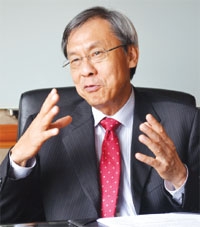Amway Vietnam the bright future ahead
 Low Han Kee came to Vietnam in 2004 to survey the market potential in preparation for setting up Amway's business arm. Three years after direct selling Amway Vietnam opened a factory in Dong Nai province and launched its products in 2008, Han Kee, now president of Amway Southeast Asia, can outline the firm's success story in this expanding market.
Low Han Kee came to Vietnam in 2004 to survey the market potential in preparation for setting up Amway's business arm. Three years after direct selling Amway Vietnam opened a factory in Dong Nai province and launched its products in 2008, Han Kee, now president of Amway Southeast Asia, can outline the firm's success story in this expanding market.
What story are you going to tell about Amway Vietnam?
Vietnam has become a very exciting market for Amway because we have made a successful business here and are now working well with the government. Frankly speaking, the first time we arrived in 2004, people were sceptical about direct selling. However, we were given a chance to prove ourselves and over the last three years we have built our credibility and reputation in the marketplace.
We have put in place a set of rules to govern the behaviours of our distributors, a lot of courses to make sure that our distributors are properly trained and conduct the business in a ethical manner. We are now one of very few direct selling companies in Vietnam that has its own factory for manufacturing of raw materials to finished products. Many people have joined us from the beginning because they love our working environment, have good career opportunities and grow with the company.
How fast has Amway Vietnam grown over the past years?
In 2010, our sales exceeded $30 million and doubled 2009's results. We are expecting double-digit growth this year. We are now looking for a bigger facility because our current offices are not big enough for our employees as well as for distributors. This means our expansion in Vietnam will never stop.
Amway Vietnam is growing very fast but it is still a baby in the sense that our distributors are quite new in the direct selling business compared to some other markets. Amway Malaysia has been in the market for 35 years, Amway Thailand with around 25 years, Amway Indonesia with 20 years, Amway Philippines with 15 years and Amway Singapore with 10 years. So, Amway Vietnam is the youngest member of the Amway family in South East Asia.
Currently, we have about 50 products and you know that Amway has more than 400 products in the United States. Obviously, there are a lot of opportunities for growth and expansion. But I think the most important thing is our people. We want to grow our people with management skills and better understanding about our objectives. We will continue to invest a lot of money for training our employees and distributors.
Will Amway Vietnam showcase more products at the shop just opened in Ho Chi Minh City?
Definitely, we will increase our product portfolio. Every year, we plan to introduce from five to eight new products. We want to open shops in Ho Chi Minh City and Hanoi because shop is a new concept for direct selling.
Having shops is one of the best ways for us to showcase many of our products and brands to the public, and everybody can walk in and see what we sell. So, shops are for us to build our reputation and credibility of brand-name. Shops also provide convenience for our distributors to buy products.
You know every time I come to Vietnam, I sit down with my management team to talk about expansion. We have opened six retail distribution centres in Hanoi, Ho Chi Minh City, Can Tho, Vinh, Danang and Haiphong. We are going to open another one in Dong Nai this year.
What's your comment on the fact that many consumers still complain about direct selling?
People in the market are not happy with some of the direct selling companies because they are trying to recoup people for money. So, the products they sell mainly used as tools to recruit people, like an investment scheme for people to buy the products, not to consume but to join the scheme to make money. Eventually, most of this scheme collapses as it is not sustainable. Layers of true direct selling are just the way of calculating commissions and paying a fixed commission for every dollar of the product sold.
For example, if our commission is 15 per cent, we only pay 15 per cent out for distributors based on their sales volume. Only people generating volume will get commission so the number of layers does not have impact on our pricing. Common marketing companies have many wholesalers and these wholesalers have many retailers, who sell products and get commission.
What the stars mean:
★ Poor ★ ★ Promising ★★★ Good ★★★★ Very good ★★★★★ Exceptional
Related Contents
Latest News
More News
- State corporations poised to drive 2026 growth (February 03, 2026 | 13:58)
- Why high-tech talent will define Vietnam’s growth (February 02, 2026 | 10:47)
- FMCG resilience amid varying storms (February 02, 2026 | 10:00)
- Customs reforms strengthen business confidence, support trade growth (February 01, 2026 | 08:20)
- Vietnam and US to launch sixth trade negotiation round (January 30, 2026 | 15:19)
- Digital publishing emerges as key growth driver in Vietnam (January 30, 2026 | 10:59)
- EVN signs key contract for Tri An hydropower expansion (January 30, 2026 | 10:57)
- Vietnam to lead trade growth in ASEAN (January 29, 2026 | 15:08)
- Carlsberg Vietnam delivers Lunar New Year support in central region (January 28, 2026 | 17:19)
- TikTok penalised $35,000 in Vietnam for consumer protection violations (January 28, 2026 | 17:15)

 Tag:
Tag:


















 Mobile Version
Mobile Version